人教版中考英语中考英语总复习 一般将来时重点和解题方法
人教版英语英语一般将来时形式讲解及解析百度文库
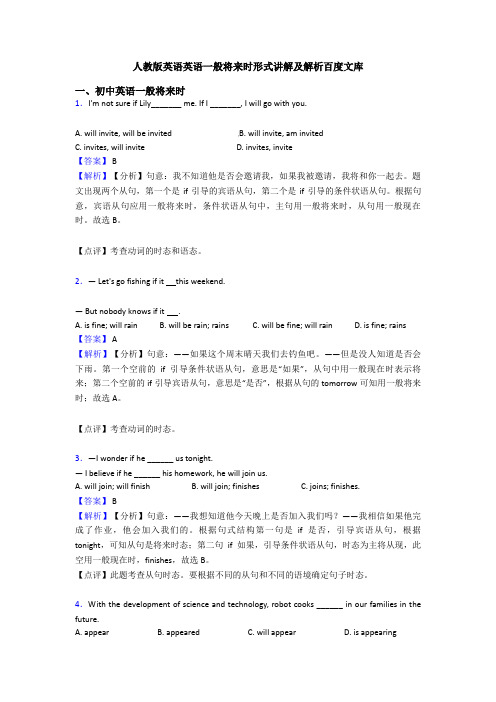
人教版英语英语一般将来时形式讲解及解析百度文库一、初中英语一般将来时1.I'm not sure if Lily_______ me. If I _______, I will go with you.A. will invite, will be invitedB. will invite, am invitedC. invites, will inviteD. invites, invite【答案】 B【解析】【分析】句意:我不知道他是否会邀请我,如果我被邀请,我将和你一起去。
题文出现两个从句,第一个是if引导的宾语从句,第二个是if引导的条件状语从句。
根据句意,宾语从句应用一般将来时,条件状语从句中,主句用一般将来时,从句用一般现在时。
故选B。
【点评】考查动词的时态和语态。
2.— Let's go fishing if it this weekend.— But nobody knows if it .A. is fine; will rainB. will be rain; rainsC. will be fine; will rainD. is fine; rains 【答案】 A【解析】【分析】句意:——如果这个周末晴天我们去钓鱼吧。
——但是没人知道是否会下雨。
第一个空前的if引导条件状语从句,意思是“如果”,从句中用一般现在时表示将来;第二个空前的if引导宾语从句,意思是“是否”,根据从句的tomorrow可知用一般将来时;故选A。
【点评】考查动词的时态。
3.—I wonder if he ______ us tonight.— I believe if he ______ his homework, he will join us.A. will join; will finishB. will join; finishesC. joins; finishes.【答案】 B【解析】【分析】句意:——我想知道他今天晚上是否加入我们吗?——我相信如果他完成了作业,他会加入我们的。
初中英语中考语法复习重难点微专题(13)一般将来时四种语法形式全面解析
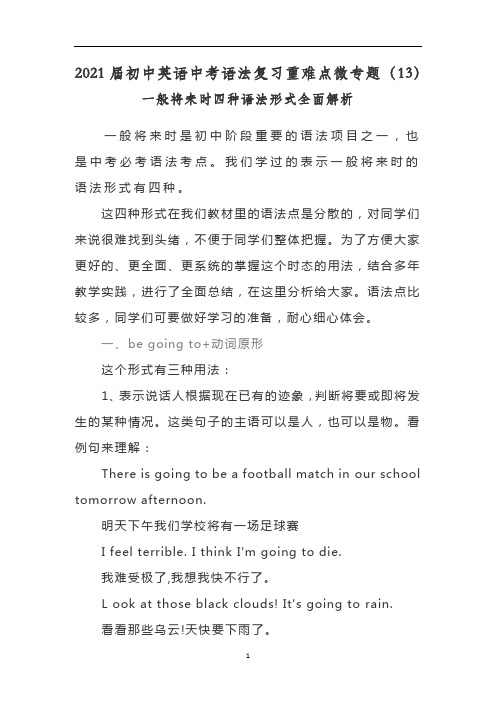
2021届初中英语中考语法复习重难点微专题(13)一般将来时四种语法形式全面解析一般将来时是初中阶段重要的语法项目之一,也是中考必考语法考点。
我们学过的表示一般将来时的语法形式有四种。
这四种形式在我们教材里的语法点是分散的,对同学们来说很难找到头绪,不便于同学们整体把握。
为了方便大家更好的、更全面、更系统的掌握这个时态的用法,结合多年教学实践,进行了全面总结,在这里分析给大家。
语法点比较多,同学们可要做好学习的准备,耐心细心体会。
一、be going to+动词原形这个形式有三种用法:1、表示说话人根据现在已有的迹象,判断将要或即将发生的某种情况。
这类句子的主语可以是人,也可以是物。
看例句来理解:There is going to be a football match in our school tomorrow afternoon.明天下午我们学校将有一场足球赛I feel terrible. I think I'm going to die.我难受极了,我想我快不行了。
L ook at those black clouds! It's going to rain.看看那些乌云!天快要下雨了。
2、表示主观现在的意图或现在已作出的决定,打算在最近或将来要做某。
这种意图或决定,往往都是事先经过考虑的。
看例子来体会:He isn't going to see his elder brother tomorrow. 他明天不准备去看他的哥哥。
Mary is going to be a teacher when she grows up. 玛丽决定长大了当一名教师。
3、只是单纯的预测未来的事,这个时候可以和will互换。
这一点对同学们来说是比较容易理解的,我们举一个简单的例子:I think it is going to/will rain this evening。
我认为今晚要下雨。
初中英语2024届中考语法复习一般现在时和一般将来时知识讲解
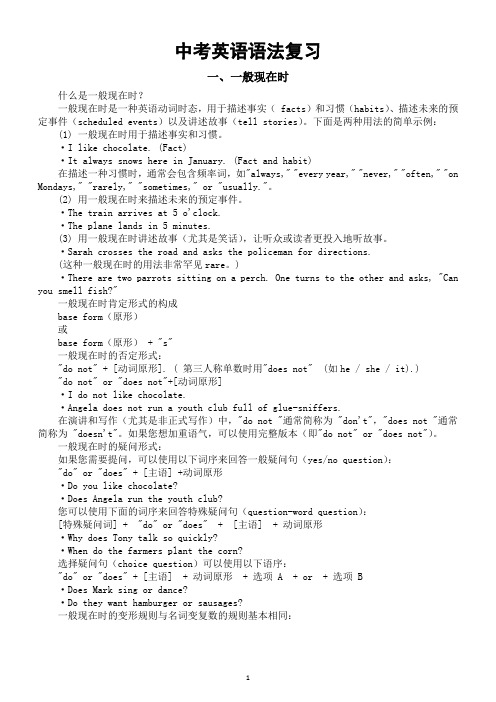
中考英语语法复习一、一般现在时什么是一般现在时?一般现在时是一种英语动词时态,用于描述事实( facts)和习惯(habits)、描述未来的预定事件(scheduled events)以及讲述故事(tell stories)。
下面是两种用法的简单示例:(1) 一般现在时用于描述事实和习惯。
·I like chocolate. (Fact)·It always snows here in January. (Fact and habit)在描述一种习惯时,通常会包含频率词,如"always," "every year," "never," "often," "on Mondays," "rarely," "sometimes," or "usually."。
(2) 用一般现在时来描述未来的预定事件。
·The train arrives at 5 o'clock.·The plane lands in 5 minutes.(3) 用一般现在时讲述故事(尤其是笑话),让听众或读者更投入地听故事。
·Sarah crosses the road and asks the policeman for directions.(这种一般现在时的用法非常罕见rare。
)·There are two parrots sitting on a perch. One turns to the other and asks, "Can you smell fish?"一般现在时肯定形式的构成base form(原形)或base form(原形) + "s"一般现在时的否定形式:"do not" + [动词原形]. ( 第三人称单数时用"does not" (如he / she / it).)"do not" or "does not"+[动词原形]·I do not like chocolate.·Angela does not run a youth club full of glue-sniffers.在演讲和写作(尤其是非正式写作)中,"do not "通常简称为 "don't","does not "通常简称为 "doesn't"。
中考英语总复习∶一般将来时(提高)知识讲解及答案经典

中考英语总复习∶一般将来时(提高)知识讲解及答案经典一、一般将来时1.—Have you finished the poster for the party?—Not yet. I it in two days.A. finishB. finishedC. will finishD. have finished【答案】 C【解析】【分析】此题的关键点在“in two days”和一般将来时连用,故选C。
句意是:—你已经完成聚会的海报了吗?—还没有,我会在两个以后完成的。
【点评】本题考查介词短语“ in +时间段”用于一般将来时。
2.Michael _________ in a school in Yunnan from February to June next year.A. teachB. taughtC. will teachD. was teaching【答案】C【解析】【分析】句意:Michael将会在明年2月到6月在云南的学校教学。
A动词原形;B一般过去时;C是一般将来时;D是过去进行时。
Next year是一般将来时的时间状语,will+动词原形,故答案为C。
【点评】考查动词的时态,注意句中的时间状语。
3.— There ________a football match on TV tonight. I can't wait to watch it.— Me, too. It's ________ Guangzhou Evergrande and the Australian team Melbourne Victory.A. will be; betweenB. will be; bothC. will have; betweenD. will have; both【答案】A【解析】【分析】句意为:---今晚将有一场电视直播足球比赛,我非常想看。
---我也是。
这是广州恒达足球俱乐部与澳大利亚墨尔本足球俱乐部之间的比赛。
中考人教版初中复习语法---一般将来时和过去将来时教学案及练习

中考人教版初中复习语法---一般将来时和过去将来时教学案及练习同学英语学科核心素养培养与个性发展研究巩固练习一.选择填空1. Li Ming said he _____happy if Brian_____to China next month.A. as; comeB. was; would comeC. would be; cameD. will be; come2. Jenny said she _____her holiday in China.A. spentB. would spentC. was going to spentD. would spend3. —What did your son say in the letter?—He told me that he ______ the Disney World the next day.A. will visitB. has visitedC. is going to visitD. would visit4. Father said that he ______ me to Beijing the next year.A. tookB. would takeC. takesD. will take5. We were not sure whether they ______ more vegetables.A. are going to growB. were going to growC. will growD. have grown6. She ______ to work when the telephone rang.A. is goingB. will goC. was about to goD. is to go7. – Where is the morning paper? – I ________ if for you at once.A. getB. am gettingC. to getD. will get8. ________ a concert next Saturday?A. There will beB. Will there beC. There can beD. There are9. If they come, we ________ a meeting.A. haveB. will haveC. hadD. would have10. He ________ her a beautiful hat on her next birthday.A. givesB. gaveC. will givingD. is going to give11. He ________ to us as soon as he gets there.A. writesB. has writtenC. will writeD. wrote12. He ________ in three days.A. coming backB. came backC. will come backD. is going to coming back13. If it ________ tomorrow, we’ll go roller-skating.A. isn’t rainB. won’t rainC. doesn’t rainD. doesn’t fine14. – Will his parents go to see the Terra Cotta Warriors tomorrow? – No, ____(不去).A. they willn’t.B. they won’t.C. they aren’t.D. they don’t.15. We ________ the work this way next time.A. doB. will doC. going to doD. will doing16. Tomorrow he ________ a kite in the open air first, and then ________ boating in the park.A. will fly; will goB. will fly; goesC. is going to fly; will goesD. flies; will go17. The day after tomorrow they ________ a volleyball match.A. will watchingB. watchesC. is watchingD. is going to watch18. There ________ a birthday party this Sunday.A. shall beB. will beC. shall going to beD. will going to be19. They ________ an English evening next Sunday.A. are havingB. are going to haveC. will havingD. is going to have20. ________ you ________ free next Sunday?A. Will; areB. Will; beC. Do; beD. Are; be二. 用所给动词的适当形式填空1. Miss Zhang said she ________(visit) the Great Wall next summer.2. She told him that she ________(not stay) here for long.3. I wasn’t sure whether Lucy_______(come) the next year.4. The scientists said the world’s population _______ (slow) down in future.5. She said the bus _______(leave) at five the next morning.6. I wasn't sure whether he _______(lend) me his book the next morning.7. He was fifty-six. In two years he _______(be) fifty-eight.8. Whenever she has time, she ______(help) them in their work.一、英语阅读理解专项练习试卷1.阅读理解I have a neighbour we call"Happy".I have never seen her angry at anything and never heard her say a bad word to anyone or about anyone.Happy and her husband Ben,70,have a huge garden.They spent many happy hours together working on it.Most of the neighbours watched interestingly as Ben doubled the size of their garden.As the cost of food climbed faster than Ben's beans,we all wished we also had such a large garden.As the rest of us spent our dollars at the market,Happy could be seen picking beans in her back yard.Last month,Happy and Ben invited most of the neighbours over for an "all-day food fest(聚会)".We were told to bring gloves and arrive very early in the morning.We didn't know what was about to take place.By 9:00a.m.,there were nine of us in the garden picking tomatoes,beans,cabbages,carrots and pumpkins.By 10:00a.m.,there was lots of laughter.We shared a lot of stories.By 5:00p.m.,everyone was a little drunk from the wine and beer.After dinner,we played games.As we were leaving,Happy and Ben handed each of us a shopping bag filled with vegetables picked that day.What a delightful gift!Well,the point wasn't so much about the food.The true gift was a day of friends getting together.This party would not have happened if it had not been for Happy and Ben's garden.Now they have a blog about gardening.We can read their blog for advice on planting our garden.Thanks to them,I am so proud of my new tomato plants!(1)We can infer that Happy and her husband Ben .A. don't like spending time with others.B. sometimes quarrel with each other.C. live on the food they grow in their garden.D. are happy to share what they have with others.(2)According to paragraph 2,people wish they also had a garden so that .A. they didn't have to spend so much money on food.B. they could grow vegetables and sell at the market.C. they could invite their neighbours and hold parties in it.D. they could spend happy times together with their family in it.(3)Happy and Ben invited the neighbours to their garden .A. to attend a birthday party.B. to help them get to know each other.C. to enjoy what they grew in the garden.D. to share some interesting stories.(4)Which of the following is the right order according to the passage?a.We drank wine and beer,shared stories and laughter.b.We picked tomatoes,beans,cabbages,carrots and pumpkins.c.We received Happy and Ben's invitation.d.Happy and Ben gave each of us a shopping bag filled with vegetables.e.We went to their house with gloves very early in the morning.A. e﹣b﹣c﹣a﹣dB. c﹣b﹣e﹣a﹣dC. c﹣e﹣b﹣a﹣dD. e﹣b﹣c﹣d﹣a(5)What did the writer most probably think of the time he spent in the garden?A. It was too long.B. It was wonderful.C. It was not as good as he thought.D. It was too terrible.【答案】(1)D(2)A(3)B(4)C(5)B【解析】【分析】短文大意:文章主要讲述的是两个老人在种菜,之后邀请周围的邻居到家里做客,他们采摘并分享新鲜的蔬菜,分享生活中快乐的瞬间。
(人教版)中考英语总复习语法:专题8-动词的时态、语态(101页)

(2)过去完成时与现在完成时的主要区别是时间参 照点不同: 过去完成时的时间参照点是某个“过去的” 时间;现在完成时的时间参照点是“现在”。因此现在 完成时中的很多规则,也适用于过去完成时。 When I got to the cinema, the film had been on. 当我到达电影院时,电影已经开始了。
以辅音字母+y结尾的动词, 把y变为i再加-ed
以一个元音字母加一个辅音 字母结尾的重读闭音节词, 双写结尾字母再加-ed
study→studied carry→carried stop→stopped drop→dropped prefer→preferred
3.一般将来时 (1)表示将来某个时间要发生的动作或存在的状 态,其构成形式:“will/shall+动词原形”。常与表 示将来的时间状语tomorrow,next week,in+一段时 间等连用。 当主语是第一人称I或we时,问句中一般用shall。
③表单纯性的将来,与人的主观愿望和判断无关 时。 If it's made of wood, it will float on water. 这要是木材做的,它能浮在水面上。 (4)当主句为一般将来时态时,在if,as soon as, until, when等引导的状语从句中用一般现在时代替一 般将来时。 I will call you as soon as I get there. 我一到那儿就给你打电话。
特殊情况:have→has,am/are→is 考查热点:如果主句为一般将来时,if,unless等 引导的条件状语从句和when,until,as soon as等引导 的时间状语从句常用一般现在时表示将来。 What about going climbing if it doesn't rain tomorrow? 如果明天不下雨,去爬山怎么样?
一般将来时知识点
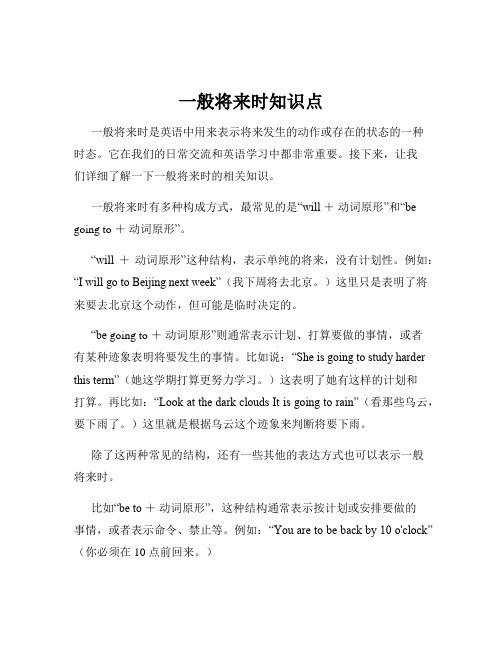
一般将来时知识点一般将来时是英语中用来表示将来发生的动作或存在的状态的一种时态。
它在我们的日常交流和英语学习中都非常重要。
接下来,让我们详细了解一下一般将来时的相关知识。
一般将来时有多种构成方式,最常见的是“will +动词原形”和“be going to +动词原形”。
“will +动词原形”这种结构,表示单纯的将来,没有计划性。
例如:“I will go to Beijing next week”(我下周将去北京。
)这里只是表明了将来要去北京这个动作,但可能是临时决定的。
“be going to +动词原形”则通常表示计划、打算要做的事情,或者有某种迹象表明将要发生的事情。
比如说:“She is going to study harder this term”(她这学期打算更努力学习。
)这表明了她有这样的计划和打算。
再比如:“Look at the dark clouds It is going to rain”(看那些乌云,要下雨了。
)这里就是根据乌云这个迹象来判断将要下雨。
除了这两种常见的结构,还有一些其他的表达方式也可以表示一般将来时。
比如“be to +动词原形”,这种结构通常表示按计划或安排要做的事情,或者表示命令、禁止等。
例如:“You are to be back by 10 o'clock”(你必须在 10 点前回来。
)“be about to +动词原形”表示即将发生的动作,通常不与具体的时间状语连用。
例如:“The film is about to start”(电影即将开始。
)在使用一般将来时的时候,要注意时间状语的搭配。
常见的时间状语有:tomorrow(明天)、next week(下周)、in the future(在未来)、soon(很快)等等。
另外,一般将来时的否定形式和疑问形式也有一定的规律。
“will +动词原形”的否定形式是“will not(won't)+动词原形”,疑问形式是把“will”提到主语前面。
人教版中考英语中考英语总复习一般将来时中考选择题(难)
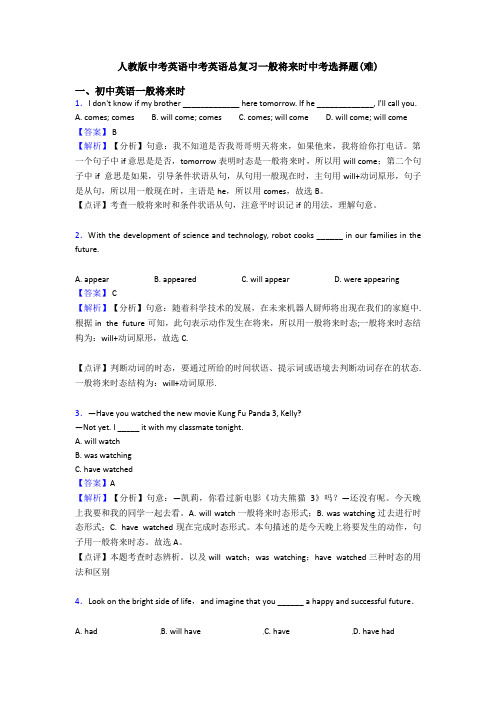
人教版中考英语中考英语总复习一般将来时中考选择题(难)一、初中英语一般将来时1.I don't know if my brother _____________ here tomorrow. If he _____________, I'll call you.A. comes; comesB. will come; comesC. comes; will comeD. will come; will come【答案】 B【解析】【分析】句意:我不知道是否我哥哥明天将来,如果他来,我将给你打电话。
第一个句子中if意思是是否,tomorrow表明时态是一般将来时,所以用will come;第二个句子中if 意思是如果,引导条件状语从句,从句用一般现在时,主句用will+动词原形,句子是从句,所以用一般现在时,主语是he,所以用comes,故选B。
【点评】考查一般将来时和条件状语从句,注意平时识记if的用法,理解句意。
2.With the development of science and technology, robot cooks ______ in our families in the future.A. appearB. appearedC. will appearD. were appearing【答案】 C【解析】【分析】句意:随着科学技术的发展,在未来机器人厨师将出现在我们的家庭中.根据in the future可知,此句表示动作发生在将来,所以用一般将来时态;一般将来时态结构为:will+动词原形,故选C.【点评】判断动词的时态,要通过所给的时间状语、提示词或语境去判断动词存在的状态.一般将来时态结构为:will+动词原形.3.—Have you watched the new movie Kung Fu Panda 3, Kelly?—Not yet. I _____ it with my classmate tonight.A. will watchB. was watchingC. have watched【答案】A【解析】【分析】句意:—凯莉,你看过新电影《功夫熊猫3》吗?—还没有呢。
- 1、下载文档前请自行甄别文档内容的完整性,平台不提供额外的编辑、内容补充、找答案等附加服务。
- 2、"仅部分预览"的文档,不可在线预览部分如存在完整性等问题,可反馈申请退款(可完整预览的文档不适用该条件!)。
- 3、如文档侵犯您的权益,请联系客服反馈,我们会尽快为您处理(人工客服工作时间:9:00-18:30)。
人教版中考英语中考英语总复习一般将来时重点和解题方法一、初中英语一般将来时1.—Tom wants to know if you ________ a picnic next Sunday.—Yes. But if it ________, we'll visit the museum instead.A. will have; will rainB. have; rainsC. have; will rainD. will have; rains 【答案】D【解析】【分析】句意:汤姆想知道下周日你们是否去野炊。
是的,但是如果下雨的话,我们将改去参观博物馆。
if引导宾语从句时,意为“是否”,句子时态根据句意选用,if 作为“假如”时,引导的是条件状语从句,主句用一般将来时,从句用一般现在时表示将来,故选D【点评】此考点也是中考最喜欢出现的考点,if除了可以引导条件状语从句外,还可以引导宾语从句,翻译成“是否”。
引导宾语从句时没有“主将从现”的说法。
除了if外,还有when, as soon as也一样要注意“主将从现”。
2.— I hear your father has gone to Tokyo on business?— Yes. And he _______ in three weeks.A. has returnedB. will returnC. would returnD. returns【答案】 B【解析】【分析】句意:—我听说你父亲出差去日本了?—是的。
他将在三周后回来。
时间状语in three weeks与一般将来时连用,故选B。
3.Look on the bright side of life,and imagine that you ______ a happy and successful future.A. hadB. will haveC. haveD. have had【答案】 B【解析】【分析】考查时态.句意"看看生活中美好的一面,想象你会有一个幸福和成功的未来.".A过去时.B一般将来时态.C动词原形.D现在完成时态.结合语境"看看生活中美好的一面,想象你___一个幸福和成功的未来.",由future未来,可知,表示将来,用一般将来时态.答案是B.4.— Excuse me. Could you tell me ?— It will leave at 4:00 p.m.A. how will you go to ShanghaiB. how you will go to ShanghaiC. when the bus would leave for ShanghaiD. when the bus will leave for Shanghai【答案】 D【解析】【分析】这是一道根据回答写出问句所缺成分的题目,阅题时要仔细分析回答的句子。
句意:打扰一下,你能告诉我这辆公交车什么时候动身前往上海吗?它将会在下午4点的时候离开。
据回答知问句问的是时间,故排除A和B。
由题知,句子是一般将来时,故问句中也要用一般将来时态。
故选D。
【点评】本题需要考生根据回答反推问题,在阅题时要仔细审题。
5.I _________ the shops. Can I get you anything?A. go toB. went toC. have gone toD. am going to【答案】 D【解析】【分析】句意:我将去商店,我可以给你买一些东西吗迭项八是一般现在时,表示经常性的行为或状态;选项B是一般过去时,表示动作发生在过去,和现在没有关系;选项C 是现在完成时,表示过去发生的动作对现在造成的影响或结果。
根据Can I get you anything?可知,说话的时候,还没有去商店,所以应该用一般将来时。
故选:D。
6.Susan and her sister ________ some photos in the park the day after tomorrow.A. takeB. tookC. will take【答案】 C【解析】【分析】句意:Susan和她的妹妹后天会在公园照一些照片。
根据时间状语the day after tomorrow,可知句子时态是一般将来时,一般将来时结构will+do,故选C。
【点评】此题考查一般将来时。
根据时间状语确定句子时态。
7.There ______ a funny cartoon on CCTV 6 this evening.A. willB. will haveC. is going to beD. is going to have【答案】 C【解析】【分析】句意:今天晚上CCTV6有一部有趣的动画片。
今天晚上,将会有,用there will be 或者there is going to be因为a funny cartoon是单数。
故选C。
【点评】考查时态的用法。
8.I Chinese dishes for my foreign friends tomorrow evening.A. will cookB. have cookedC. cookD. cooked【答案】 A【解析】【分析】考查动词时态。
句意:明天晚上我将为我的外国朋友做中国菜。
根据时间状语tomorrow evening可知,句子应该用一般将来时,故选A。
9.—May I speak to Mr. Smith?—Sorry, he _______ Australia. But he _______ in two days.A. has been to; will come backB. has gone to; will be backC. has been in; would come backD. is leaving for; doesn't come back【答案】 B【解析】【分析】考查动词的时态。
句意:——我可以和史密斯先生通话吗?——对不起,他去澳大利亚了。
但是两天后回来。
have gone to“去某地了(还没回来)”;由时间状语in two days可确定第二个空用一般将来时,故答案为B项。
10.—I've never seen Mr. Taylor before.—Don't worry. I ______ him to you before the meeting.A. will introduceB. introducedC. have introducedD. had introduced【答案】 A【解析】【分析】句意:——我以前从没见过泰勒先生。
别担心。
开会前我会把他介绍给你。
根据上句 I've never seen Mr. Taylor before. 到现在为止没有见过他,所以才有开会前介绍给你。
要用一般将来时,will+动词原形。
故选A。
【点评】考查一般将来时的构成和用法。
注意根据语境确定动词的时态。
11. We some robots at home in the future, and there some in the office,too.A. will have; will haveB. have; will beC. will have; will beD. will have; are 【答案】 C【解析】【分析】句意:在将来我们家里将有一些机器人并且办公室里也将会有一些。
there be句型表示“某地(或某时)存在有某人(或某物),而并非某地(某人、某物或某时)拥有什么东西”,句中有若干个名词作主语,动词be常与后面主语中的第一个名词在数上保持一致。
have一般表示某人有某物。
将来时态there will be 或there is /are going to be。
根据时间in the future可知两个空都用将来时,故选C。
12.Jack ______ a good rest as soon as he finishes the exam.A. hasB. hadC. is havingD. will have【答案】 D【解析】【分析】句意:Jack一完成他的考试就要好好的休息一下。
has第三人称单数形式;had是have的过去式;is having现在进行时态;will have一般将来时态。
have a rest是固定短语,意思是“休息一下”,句中的as soon as引导的是时间状语从句,从句中用一般现在时态,主句用一般将来时态,故答案选D。
【点评】考查一般将来时态。
13.— I hear Leo will leave for Korea for a meeting.— Really? Do you know when he _______.A. will startB. to startC. started【答案】 A【解析】【分析】句意:——我听说Leo要去韩国开会。
——真的吗?你知道他什么时候出发吗?when何时,此处询问将来的时间,故用一般将来时,因此选A。
【点评】考查动词的时态。
14.Robots more heavy work for us in the future.A. will doB. didC. have doneD. were doing【答案】A【解析】【分析】句意:在将来, 机器人将为我们做更多繁重的工作。
根据in the future 可知此处用一般将来时, 故选A。
【点评】一般将来时15.Hurry up. The train _________ in twenty minutes.A. leftB. has leftC. is leavingD. has been away【答案】C【解析】【分析】句意:快点。
二十分钟后火车将要离开。
根据时间状语in twenty minutes可知此处用一般将来时,表示位置移动的动词,如leave, go, come等的现在进行时表示一般将来时,故为is leaving,故答案选C。
【点评】考查短暂性的动词的进行时态表将来。
16.Mr. Smith our school next year.A. will visitB. visitsC. was visitingD. visited【答案】 A【解析】【分析】句意:史密斯先生下一年将参观我们的学校。
根据时间状语next year判断,时态为一般将来时态,故答案为A。
【点评】考查动词时态,本题涉及一般将来时的应用,表示在将来某个时间将要发生的动作或存在的状态。
